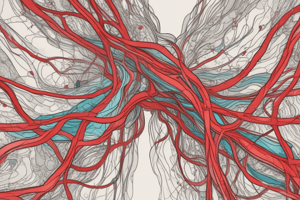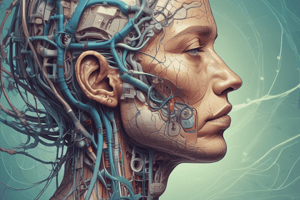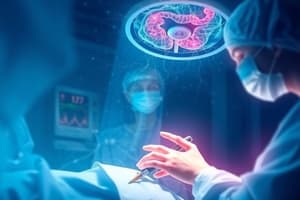Podcast
Questions and Answers
What part of the nervous system does the brain belong to?
What part of the nervous system does the brain belong to?
- Peripheral Nervous System
- Autonomic Nervous System
- Somatic Nervous System
- Central Nervous System (correct)
Which structure is located infratentorially in the brain?
Which structure is located infratentorially in the brain?
- Cerebellum (correct)
- Diencephalon
- Cerebral Hemispheres
- Thalamus
What role does the spinal cord play in transmitting signals?
What role does the spinal cord play in transmitting signals?
- It primarily prevents the brain from receiving pain sensations.
- It transmits signals only from the brain to the sensory cortex.
- It connects the brain to the peripheral nervous system and transmits nerve signals. (correct)
- It acts solely as a reflex center, with no role in signal transmission.
What system is responsible for voluntary muscle movements?
What system is responsible for voluntary muscle movements?
Which nervous system is primarily responsible for involuntary functions?
Which nervous system is primarily responsible for involuntary functions?
During which week of development does the neural plate begin to form?
During which week of development does the neural plate begin to form?
What is the function of the nucleus raphe magnus when stimulated?
What is the function of the nucleus raphe magnus when stimulated?
Which part of the brain facilitates communication between different brain regions?
Which part of the brain facilitates communication between different brain regions?
What constitutes the bony shell that encases the spinal cord?
What constitutes the bony shell that encases the spinal cord?
Which division of the autonomic nervous system is active during 'fight or flight' responses?
Which division of the autonomic nervous system is active during 'fight or flight' responses?
How many segments make up the spinal cord?
How many segments make up the spinal cord?
Which structure is NOT part of the brainstem?
Which structure is NOT part of the brainstem?
The thalamus is primarily associated with which function?
The thalamus is primarily associated with which function?
Which structures are formed from cells at the cephalic end of the neural plate?
Which structures are formed from cells at the cephalic end of the neural plate?
What is the primary role of the reflex arcs in the spinal cord?
What is the primary role of the reflex arcs in the spinal cord?
What happens to the neural plate by the end of the fourth week of development?
What happens to the neural plate by the end of the fourth week of development?
Who are the editors of the Textbook of Neuroanesthesia and Neurocritical Care?
Who are the editors of the Textbook of Neuroanesthesia and Neurocritical Care?
What is the primary focus of Volume I of the Textbook of Neuroanesthesia and Neurocritical Care?
What is the primary focus of Volume I of the Textbook of Neuroanesthesia and Neurocritical Care?
Which institution is affiliated with Hemanshu Prabhakar?
Which institution is affiliated with Hemanshu Prabhakar?
What does the ISBN number indicate about the Textbook of Neuroanesthesia and Neurocritical Care?
What does the ISBN number indicate about the Textbook of Neuroanesthesia and Neurocritical Care?
Which of the following statements about copyright is true regarding the textbook?
Which of the following statements about copyright is true regarding the textbook?
What is the role of Zulfiqar Ali as mentioned in the information provided?
What is the role of Zulfiqar Ali as mentioned in the information provided?
Where is the Sher-i-Kashmir Institute of Medical Sciences located?
Where is the Sher-i-Kashmir Institute of Medical Sciences located?
What does the Library of Congress Control Number referred to in the textbook signify?
What does the Library of Congress Control Number referred to in the textbook signify?
What is the primary neurotransmitter involved in the sympathetic system?
What is the primary neurotransmitter involved in the sympathetic system?
Which system is described as allowing the body to 'rest and digest'?
Which system is described as allowing the body to 'rest and digest'?
What physiological response is mediated by norepinephrine and epinephrine?
What physiological response is mediated by norepinephrine and epinephrine?
What occurs in the sympathetic system when the body perceives great stress?
What occurs in the sympathetic system when the body perceives great stress?
Which statement accurately describes a function of acetylcholine?
Which statement accurately describes a function of acetylcholine?
Which system is typically activated during a relaxation response?
Which system is typically activated during a relaxation response?
Which neurotransmitter is associated with stress responses and prepares the body for action?
Which neurotransmitter is associated with stress responses and prepares the body for action?
Which of the following best defines the role of the parasympathetic system?
Which of the following best defines the role of the parasympathetic system?
What is the role of the dura mater in the central nervous system?
What is the role of the dura mater in the central nervous system?
Which layer of the meninges has an open, spiderlike appearance?
Which layer of the meninges has an open, spiderlike appearance?
Where is cerebrospinal fluid (CSF) produced?
Where is cerebrospinal fluid (CSF) produced?
What are the primary components of the white matter in the spinal cord?
What are the primary components of the white matter in the spinal cord?
What is found in the subarachnoid space?
What is found in the subarachnoid space?
Which structure is responsible for accessing cerebrospinal fluid during neuraxial anesthesia?
Which structure is responsible for accessing cerebrospinal fluid during neuraxial anesthesia?
The gracile fasciculus below T6 primarily carries input from which part of the body?
The gracile fasciculus below T6 primarily carries input from which part of the body?
What is the main function of lateral white matter in the spinal cord?
What is the main function of lateral white matter in the spinal cord?
Flashcards are hidden until you start studying
Study Notes
Neuroanesthesia Overview
- Editors of the textbook are Hemanshu Prabhakar and Zulfiqar Ali, affiliated with prominent medical institutions in India.
- Volume I focuses on Neuroanesthesia, crucial for managing anesthesia in neurosurgical patients.
Nervous System Anatomy
- The nervous system is divided into Central Nervous System (CNS) and Peripheral Nervous System (PNS).
- CNS consists of the brain (includes supratentorial and infratentorial structures) and spinal cord.
- PNS further delineates into somatic and autonomic nervous systems, with autonomic divided into sympathetic and parasympathetic systems.
Spinal Cord Development
- The spinal cord develops from the ectoderm, forming a neural plate by the third week of gestation.
- Neural tube formation occurs by the end of the fourth week, leading to the structure of the forebrain, midbrain, and hindbrain.
Spinal Cord Functionality
- Spinal cord is essential for relaying motor signals from the brain and sensory signals from the body.
- Composed of 31 segments, each providing a pair of sensory and motor nerve roots.
- Coordinates reflex actions via various reflex arcs (e.g., knee jerk reflex).
Protective Layers of Spinal Cord
- The spinal cord is encased in three protective layers known as meninges: dura mater (outer), arachnoid mater (middle), and pia mater (inner).
- The epidural space between the vertebrae and dura mater contains adipose tissue and blood vessels, serving as a cushioning layer.
Cerebrospinal Fluid (CSF)
- CSF circulates within the subarachnoid space, critical for cushioning the brain and spinal cord.
- Derived from the lateral ventricles, it passes through various ventricular structures before reaching the subarachnoid space.
Autonomic Nervous System (ANS)
- Sympathetic system triggers "fight or flight" responses, increasing heart rate and blood flow to essential areas during stress.
- Parasympathetic system promotes “rest and digest” mechanisms, primarily using acetylcholine as its neurotransmitter.
Clinical Relevance
- Understanding the anatomical and physiological details of the nervous system is vital for successful neuroanesthesia management.
- Recognizing the implications of autonomic responses is fundamental for perioperative care in neurosurgical procedures.
Studying That Suits You
Use AI to generate personalized quizzes and flashcards to suit your learning preferences.




